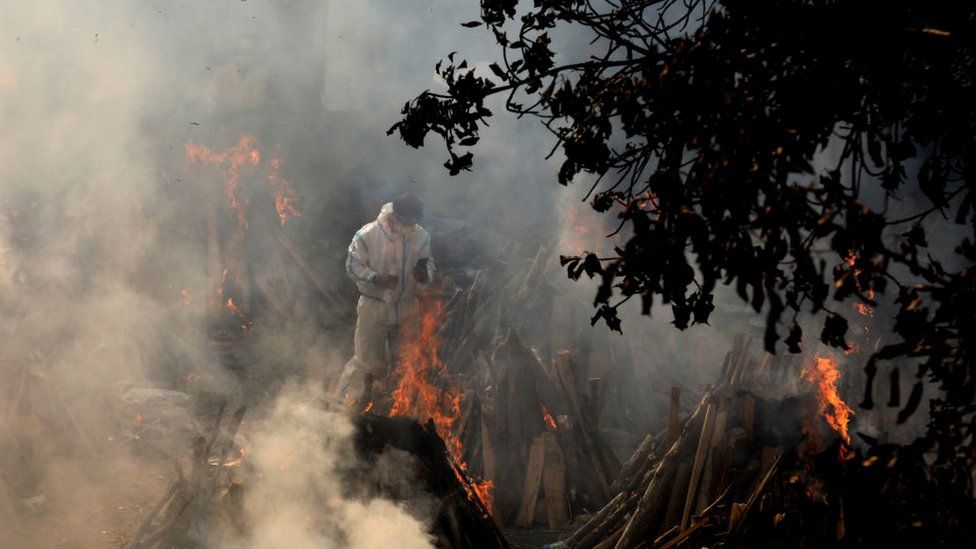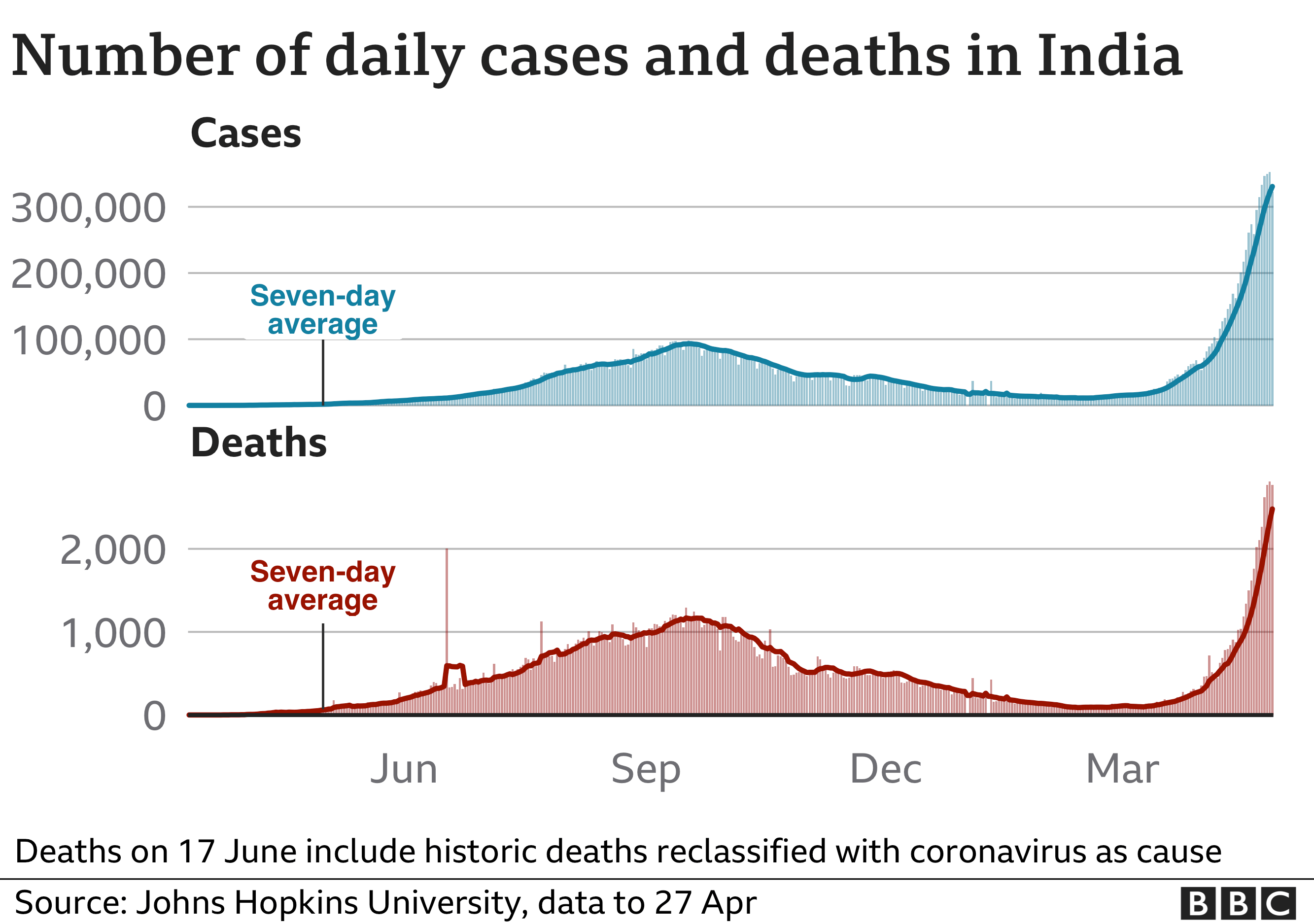
Crematoriums in the Indian capital Delhi have been forced to build makeshift funeral pyres, as the city runs out of space to cremate its dead.
Staff are working around the clock, while parks and other empty spaces are also being utilised for cremations.
Families have had to wait hours before being allowed to cremate their dead due to the rise in demand.
Deaths have been surging in India as a second wave of infections devastates the country.
The rising number of deaths - 380 were recorded in Delhi alone on Monday - has left crematoriums in urgent need of space.
At the capital city's Sarai Kale Khan crematorium, at least 27 new pyres have been built and dozens more are being added in a nearby park. Officials are also looking for additional space near the city's Yamuna river bed.
A worker at the crematorium, which originally had capacity for only 22 bodies, told The Hindu newspaper that they are operating continuously from early morning until midnight.
In Delhi, the authorities have reportedly cut down trees in city parks for use as kindling on funeral pyres. Relatives of the dead have also been asked to help with cremations by piling wood and assisting in other rituals.


The Ghazipur crematorium in East Delhi has added 20 more pyres in a car park. One official told the Indian Express newspaper that there was a waiting time of three to four hours for cremation, with each body taking up to six hours to burn.
The situation is serious at other crematoriums too. Sunil Kumar Aledia, who runs the Centre for Holistic Development, an organisation that is providing assistance with oxygen, meals and cremations, told the BBC that some do not have any space to expand.

Demand for cremation is likely to remain high. In Delhi - with its population of about 20 million people - hospitals are full and medical oxygen is scarce.
How serious is the situation in India?
India has recorded more than a million Covid-19 cases in just a few days. Ambulances, medical oxygen, intensive care unit (ICU) beds and life-saving medicines are all in short supply.
At least two hospitals in Delhi have seen patients die after oxygen supplies ran out. It is becoming difficult for families to take their sick to hospitals even if they manage to find a bed, and many people have died while waiting for one.
The city's testing capacity has also been overwhelmed.
Social media is awash with frantic pleas for help, with people desperately searching for oxygen cylinders, medicines and ICU beds.

Read more of our coronavirus coverage:

Many countries have offered assistance. The UK has begun sending ventilators and oxygen concentrator devices and European Union member states are also due to send aid.
US President Joe Biden spoke to Prime Minister Narendra Modi and pledged America's "full support". The US is lifting a ban on sending raw materials for vaccine producation abroad, enabling India to manufacture more AstraZeneca doses. It will also provide medical equipment and protective gear.
But Zarir Udwadia, who works in Mumbai hospitals and counsels the government, told the BBC's Today programme the currently pledged supplies would have limited effects. He said he was seeing "ward after ward full of patients struggling to breathe on ventilators of different forms and shapes".
The number of reported cases declined slightly on Tuesday to 323,144 from the peak of more than 350,000 the day before. The total number of Indian cases so far is nearly 17 million with 192,000 deaths.
But it is thought the true figures are far higher.
An investigation by television station NDTV found at least 1,150 extra deaths which were not included in Delhi's official Covid count over the last week. Other investigations have found similar examples of undercounting replicated around the country.

On Wednesday, the BBC is bringing you a special day of coverage on the deepening coronavirus crisis in India and its significance for the global fight against the pandemic. We'll have reports, interviews and analysis across BBC TV, radio and digital throughout the day.

What do you want to know about Covid in India? Our reporter will answer a selection of questions. Please ask your question by filling the form below or by emailing haveyoursay@bbc.co.uk.
Please include a contact number if you are willing to speak to a BBC journalist. You can also get in touch in the following ways:
- WhatsApp: +44 7756 165803
- Tweet: @BBC_HaveYourSay
- Please read our terms & conditions and privacy policy
If you are reading this page and can't see the form you will need to visit the mobile version of the BBC website to submit your question or comment or you can email us at HaveYourSay@bbc.co.uk. Please include your name, age and location with any submission.

COVID-19 - Latest - Google News
April 27, 2021 at 10:17PM
https://ift.tt/3dUYEE3
India Covid: Delhi builds makeshift funeral pyres as deaths climb - BBC News
COVID-19 - Latest - Google News
https://ift.tt/2VQ2gy8

No comments:
Post a Comment